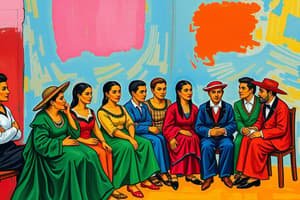Podcast
Questions and Answers
What do most Americans claim about their class status? Select one:
What do most Americans claim about their class status? Select one:
- They don't believe in class.
- They are lower class.
- They don't feel they have a class status, or they are unaware of it.
- They are upper class.
- They are middle class. (correct)
Which of the following is true of the upper 1% class in the United States today? Select one:
Which of the following is true of the upper 1% class in the United States today? Select one:
- They are comprised mainly of skilled workers in technical fields.
- They are not usually very well educated.
- They make up about 30 percent of the population.
- They are a largely self-sustaining group and rarely add new members. (correct)
- They usually work in managerial and professional jobs.
If an individual takes adult education classes, attends lectures and concerts, or travels to Europe, what might he be trying to gain more of? Select one:
If an individual takes adult education classes, attends lectures and concerts, or travels to Europe, what might he be trying to gain more of? Select one:
- Souvenirs
- Credentials
- Cultural capital (correct)
- Tennis shoes
- Wealth
According to Bourdieu, Francisco acquired ____________ from his parents. Select one:
According to Bourdieu, Francisco acquired ____________ from his parents. Select one:
The average age at which people marry and start families is not related to social class.
The average age at which people marry and start families is not related to social class.
What is wrong with treating Oprah Winfrey as the ultimate symbol of the American Dream? Select one:
What is wrong with treating Oprah Winfrey as the ultimate symbol of the American Dream? Select one:
The American Dream legitimizes social stratification by reinforcing the idea that Select one:
The American Dream legitimizes social stratification by reinforcing the idea that Select one:
What is the maximum length of time a family can collect welfare based on the welfare reforms provided in the Personal Responsibility and Work Opportunity Reconciliation Act? Select one:
What is the maximum length of time a family can collect welfare based on the welfare reforms provided in the Personal Responsibility and Work Opportunity Reconciliation Act? Select one:
The culture of poverty theory has been almost universally accepted within sociology.
The culture of poverty theory has been almost universally accepted within sociology.
Apartheid is a specific example of what system of social stratification? Select one:
Apartheid is a specific example of what system of social stratification? Select one:
Social stratification is basically a U.S. phenomenon, and it doesn't really happen in most other parts of the world.
Social stratification is basically a U.S. phenomenon, and it doesn't really happen in most other parts of the world.
In industrialized, capitalist societies, stratification systems are most commonly based on __________.
In industrialized, capitalist societies, stratification systems are most commonly based on __________.
What sorts of jobs are usually available to members of the lower-middle or working class? Select one:
What sorts of jobs are usually available to members of the lower-middle or working class? Select one:
Mother Teresa is an example of which of the following? Select one:
Mother Teresa is an example of which of the following? Select one:
Unlike students at public schools, elite private school students are often offered the opportunity to learn tennis and golf in their PE classes. This is because Select one:
Unlike students at public schools, elite private school students are often offered the opportunity to learn tennis and golf in their PE classes. This is because Select one:
The idea that anyone, no matter where they start out, can, with hard work, succeed in whatever they set out to do is a belief system that explains and justifies America's class hierarchy.
The idea that anyone, no matter where they start out, can, with hard work, succeed in whatever they set out to do is a belief system that explains and justifies America's class hierarchy.
Study Notes
Social Class and Status
- Most Americans perceive themselves as middle class, highlighting a national sentiment regarding class identity.
- The upper 1% in the U.S. is characterized as a largely self-sustaining group with limited new membership, primarily working in managerial and professional roles.
Cultural Capital
- Engaging in adult education, attending cultural events, and international travel contribute to an individual's cultural capital, which encompasses education and social skills.
- Bourdieu's concept of cultural capital is exemplified by individuals like Francisco, who benefit from highly educated parents, leading to academic success and opportunities.
Marriage and Social Class
- The timing of marriage and family formation is influenced by social class, disputing claims of independence from class structure.
The American Dream
- The notion of the American Dream suggests that success is solely determined by individual effort, often overlooking systemic inequalities that affect opportunities.
Welfare Reforms
- Families may receive welfare benefits for a maximum of five years following reforms established by the Personal Responsibility and Work Opportunity Reconciliation Act.
Social Stratification Theories
- The culture of poverty theory lacks universal acceptance among sociologists, reflecting ongoing debates about poverty and social structure.
- Apartheid serves as a clear example of a caste system, showcasing legalized social stratification based on race.
Global Social Stratification
- Social stratification is not exclusive to the United States; it exists in various forms globally, indicating a widespread issue.
Industrialized Societies
- In industrialized, capitalist societies, social stratification typically arises from a social class system rather than feudal or caste systems.
Employment and Class
- Lower-middle and working-class individuals often occupy blue collar jobs, which may be associated with underemployment and reliance on public assistance.
Status Inconsistency
- Mother Teresa exemplifies status inconsistency, possessing significant prestige and influence while simultaneously experiencing poverty.
Elite Education and Social Reproduction
- Elite private schools offer extracurricular activities, such as tennis and golf, to reinforce social reproduction by providing experiences beneficial to upper-class students.
Beliefs about Success
- The belief that hard work can lead to success for anyone, regardless of their starting point, serves to justify America's class hierarchy and perpetuates existing inequalities.
Studying That Suits You
Use AI to generate personalized quizzes and flashcards to suit your learning preferences.
Description
Test your knowledge of class structures and statuses in America with these flashcards from Sociology Chapter 7. This quiz includes critical thinking questions about the perceptions and realities of different social classes. Perfect for midterm preparation!




